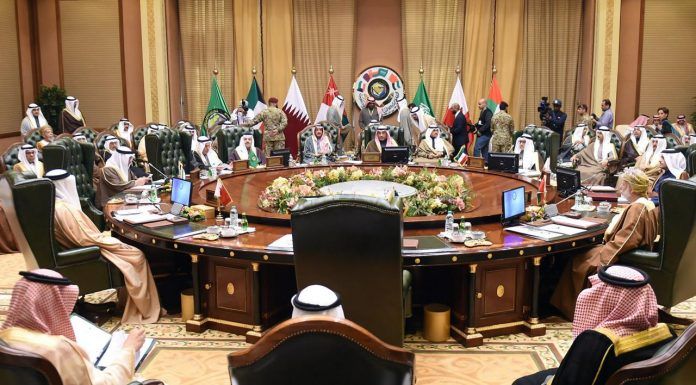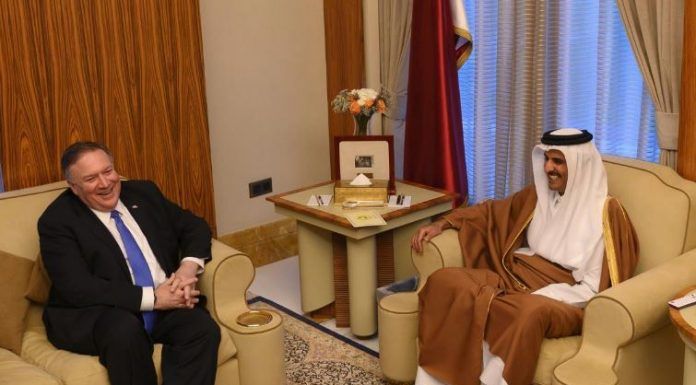15 Jan – U.S. Secretary of State Mike Pompeo has called on member states of the Gulf Cooperation Council (GCC) to unite against Iran, in a statement issued Friday by the State Department. Pompeo has asked GCC members to work together to back the U.S. in putting pressure on the Islamic Republic.
The statement was released on 11 January, a day before the Secretary of State was due to visit the Persian Gulf. Addressing the GCC, which is made up of all Arab states within the Persian Gulf except Iraq, Pompeo said that the campaign’s main objective was to counter the Iranian regime, calling Iran’s government the single greatest threat to regional stability.
Pompeo went on to say that the partnership between the U.S. and Gulf countries was vital in fighting ISIS, stopping Islamic terrorism, protecting the world’s energy supplies and stemming Iranian aggression. Pompeo also confirmed that he would lead the U.S. delegations at the U.S.-Qatar and U.S.-Kuwait Strategic Dialogues to develop joint efforts in areas including defense, counterterrorism, trade and investment, energy, education, and culture. The statement, which was categorized as a Fact Sheet by the State Department, mentions that the United States is currently Qatar’s biggest foreign investor and single largest source of imports, with over 120 U.S. companies operating in the country.
A pressure campaign against Iran was launched last year by President Donald Trump after pulling the United States out of the nuclear deal. As part of the campaign’s mission Trump reimposed sanctions in August, targeting Iran’s economy. A second round of sanctions followed in November 2018, which focused on cutting off Iran’s oil exports. In a press release published on 5 November by the U.S. Department of the Treasury, Steven Mnuchin demanded that Iran stop supporting terrorism and set aside its nuclear ambitions. Explaining the demands, Mnuchin said that the “Treasury’s imposition of unprecedented financial pressure on Iran should make clear to the Iranian regime that they will face mounting financial isolation and economic stagnation until they fundamentally change their destabilizing behavior.”
As part of the campaign’s plans the State Department is now looking to Arab States to exert pressure on Iran through renewed levels of co-operation and relationship-building. The statement outlines eight strategies which the U.S. government hopes will be developed with the support of the GCC: combating the Iranian regime; finalizing the Middle East Strategic Alliance (MESA), a partnership incorporating the GCC and Egypt which has been dubbed the Arab NATO after the alliance was modelled on the North Atlantic Treaty Alliance; working with Bahrain to highlight and combat agents of the Iranian Revolutionary Guard Corps (IRGC); collaborating with the United Arab Emirates to target disruptive financial schemes that benefit the Iranian government; monitoring sanctions compliance with Kuwait, Qatar and Oman’s assistance; preventing illicit material transfers alongside Oman; and preventing the Iranian regime’s expansion in the region with Saudi Arabia, which works closely with the U.S. already in this area.
[aesop_image img=”https://kayhanlife.com/wp-content/uploads/2019/01/Pomepo-7.jpg” panorama=”off” align=”center” lightbox=”on” caption=”U.S. Secretary of State Mike Pompeo meets with Saudi’s Minister of State for Foreign Affairs Adel al-Jubeir upon his arrival in Riyadh, Saudi Arabia January 13, 2019. Andrew Caballero-Reynolds/Pool via Reuters” captionposition=”center” revealfx=”off” overlay_revealfx=”off”]
The statement asking for Gulf States’ support in ramping up the U.S.’s pressure campaign on Iran was published on the same day that the Department of State announced that the U.S. government would be co-hosting a forum with Poland in February looking at peace and security issues in the Middle East. The United States considers Poland to be one of its strongest allies In Europe, with a shared interest in developing security regionally and globally. Countries from around the world have been invited to participate in the forum.
Pompeo confirmed that the Iranian government’s activities would be central to the discussions. The Secretary of State confirmed the agenda on 12 January during an interview with Lebanese journalist Najwa Kassem of Al Arabiya, a Saudi-owned TV news channel based in Dubai. Pompeo told Kassem, “This will be a broad coalition aimed at Middle East stability. We’ll talk about how we counter terror. There’ll be a focus on Iran.”



